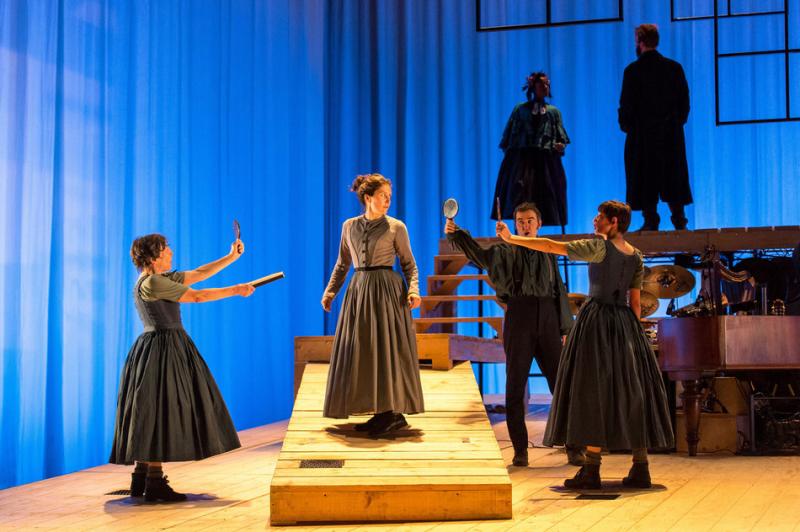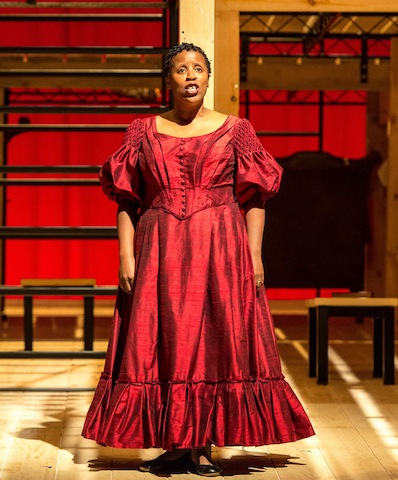Jane Eyre, National Theatre | reviews, news & interviews
Jane Eyre, National Theatre
Jane Eyre, National Theatre
An ardent theatrical reimagining of a classic novel

Last February, director Sally Cookson shrunk Charlotte Brontë’s 400-page novel Jane Eyre down to a four-and-a-half-hour play spread across two nights at the Bristol Old Vic. Now, as this co-production finally arrives at the National Theatre, it has slimmed still further – shedding one hour and one night to become a (comparatively) brisk Hamlet-length evening of physically and sensorily-charged theatre.
Time was when books stayed on the bedside table, stories to come home to after a night in the theatre. Now, post-David Edgar’s Nicholas Nickleby for the RSC, the NT’s own His Dark Materials, and of course Wolf Hall, we’re getting used to even the biggest and longest works being neatly filleted for live performance. Whether or not you find it a task worth undertaking (I confess, I’m not sure it often is), Cookson’s adaptation is one of the good ones – a genuine theatrical reimagining rather than a straight translation.
An affectionate, ardent theatrical tribute to Brontë’s novel
A cast of just eight actors and two musicians together take us from Jane’s birth through to her climactic encounter with Edward Fairfax Rochester at Thornfield Hall, her desperate flight and eventual return to its ruin. They are aided by Michael Vale’s assault-course of a set – all ladders and wooden walkways – whose multiple levels, entry and exit points are merely the starting point for an endless sequence of imagined landscapes and interiors. Thanks to Aideen Malone’s endlessly sensitive lighting design it’s a surprisingly easy narrative to conjure.
The cast themselves offer us a script that emerges largely from Brontë’s own text (with some conscious diversions), a spoken scaffolding for the real business of the evening which is all physical. This is not Complicite; text still stands alone, but it is amplified by gestures and devices – physical doubling (and trebling), spoken sound-effects, slow-motion movement, infinite cast shifting, animals and even inanimate objects brought to life – that help grease the wheels of this breathless drama.
In losing time the play has become a little less balanced, with the narrative preamble – Jane’s time at Gateshead and later at Lowood Institution – pulling back hard on the narrative reins, keeping us from the meat of the story for well over an hour. The pay-off for a slow start is a galloping second half, whisking perhaps a little too swiftly through the episode involving zealous missionary St John Rivers (a chillingly fervent Laura Elphinstone, who earlier managed to humanise the ghastly prig Helen Burns) before retreating to its happy ending.
 While it’s hard to fault the energy and flexibility of the cast, led by Madeleine Worrall’s Jane – staunch, fiery, tracing the character from uncontrolled childhood passion to adult interiority – there are inevitably losses as well as gains with such a reworking. The latter include a potently expanded Bertha Mason (Melanie Marshall, pictured left), given in song what she is denied in speech, Felix Hayes’s dominant Rochester and lovely touches like Craig Edwards’ indefatigable Pilot (Rochester’s dog) with Benji Bower’s luminous score stitching this fragmented drama together. The former, however, would have to acknowledge a little too much melodrama – verging on the mawkish – in the early episodes (a problem dealt with by the book’s first-person narrator, growing from youthful excess to more mature reflection), and pacing that takes a while to settle.
While it’s hard to fault the energy and flexibility of the cast, led by Madeleine Worrall’s Jane – staunch, fiery, tracing the character from uncontrolled childhood passion to adult interiority – there are inevitably losses as well as gains with such a reworking. The latter include a potently expanded Bertha Mason (Melanie Marshall, pictured left), given in song what she is denied in speech, Felix Hayes’s dominant Rochester and lovely touches like Craig Edwards’ indefatigable Pilot (Rochester’s dog) with Benji Bower’s luminous score stitching this fragmented drama together. The former, however, would have to acknowledge a little too much melodrama – verging on the mawkish – in the early episodes (a problem dealt with by the book’s first-person narrator, growing from youthful excess to more mature reflection), and pacing that takes a while to settle.
But as an exhilarating piece of ensemble creation – an affectionate, ardent theatrical tribute to Brontë’s novel – it’s hard to argue with a play that takes all of Jane Eyre’s emotional intelligence, its measured thoughtfulness, and allies it to the unrestrained urgencies of Wuthering Heights. So set your watch to “Victorian” and surrender the emotional long-game of this lovingly-crafted show.
rating
Share this article
The future of Arts Journalism
You can stop theartsdesk.com closing!
We urgently need financing to survive. Our fundraising drive has thus far raised £49,000 but we need to reach £100,000 or we will be forced to close. Please contribute here: https://gofund.me/c3f6033d
And if you can forward this information to anyone who might assist, we’d be grateful.

Subscribe to theartsdesk.com
Thank you for continuing to read our work on theartsdesk.com. For unlimited access to every article in its entirety, including our archive of more than 15,000 pieces, we're asking for £5 per month or £40 per year. We feel it's a very good deal, and hope you do too.
To take a subscription now simply click here.
And if you're looking for that extra gift for a friend or family member, why not treat them to a theartsdesk.com gift subscription?
more Theatre
 Troilus and Cressida, Globe Theatre review - a 'problem play' with added problems
Raucous and carnivalesque, but also ugly and incomprehensible
Troilus and Cressida, Globe Theatre review - a 'problem play' with added problems
Raucous and carnivalesque, but also ugly and incomprehensible
 Clarkston, Trafalgar Theatre review - two lads on a road to nowhere
Netflix star, Joe Locke, is the selling point of a production that needs one
Clarkston, Trafalgar Theatre review - two lads on a road to nowhere
Netflix star, Joe Locke, is the selling point of a production that needs one
 Ghost Stories, Peacock Theatre review - spirited staging but short on scares
Impressive spectacle saves an ageing show in an unsuitable venue
Ghost Stories, Peacock Theatre review - spirited staging but short on scares
Impressive spectacle saves an ageing show in an unsuitable venue
 Hamlet, National Theatre review - turning tragedy to comedy is no joke
Hiran Abeyeskera’s childlike prince falls flat in a mixed production
Hamlet, National Theatre review - turning tragedy to comedy is no joke
Hiran Abeyeskera’s childlike prince falls flat in a mixed production
 Rohtko, Barbican review - postmodern meditation on fake and authentic art is less than the sum of its parts
Łukasz Twarkowski's production dazzles without illuminating
Rohtko, Barbican review - postmodern meditation on fake and authentic art is less than the sum of its parts
Łukasz Twarkowski's production dazzles without illuminating
 Lee, Park Theatre review - Lee Krasner looks back on her life as an artist
Informative and interesting, the play's format limits its potential
Lee, Park Theatre review - Lee Krasner looks back on her life as an artist
Informative and interesting, the play's format limits its potential
 Measure for Measure, RSC, Stratford review - 'problem play' has no problem with relevance
Shakespeare, in this adaptation, is at his most perceptive
Measure for Measure, RSC, Stratford review - 'problem play' has no problem with relevance
Shakespeare, in this adaptation, is at his most perceptive
 The Importance of Being Earnest, Noël Coward Theatre review - dazzling and delightful queer fest
West End transfer of National Theatre hit stars Stephen Fry and Olly Alexander
The Importance of Being Earnest, Noël Coward Theatre review - dazzling and delightful queer fest
West End transfer of National Theatre hit stars Stephen Fry and Olly Alexander
 Get Down Tonight, Charing Cross Theatre review - glitz and hits from the 70s
If you love the songs of KC and the Sunshine Band, Please Do Go!
Get Down Tonight, Charing Cross Theatre review - glitz and hits from the 70s
If you love the songs of KC and the Sunshine Band, Please Do Go!
 Punch, Apollo Theatre review - powerful play about the strength of redemption
James Graham's play transfixes the audience at every stage
Punch, Apollo Theatre review - powerful play about the strength of redemption
James Graham's play transfixes the audience at every stage
 The Billionaire Inside Your Head, Hampstead Theatre review - a map of a man with OCD
Will Lord's promising debut burdens a fine cast with too much dialogue
The Billionaire Inside Your Head, Hampstead Theatre review - a map of a man with OCD
Will Lord's promising debut burdens a fine cast with too much dialogue

Add comment